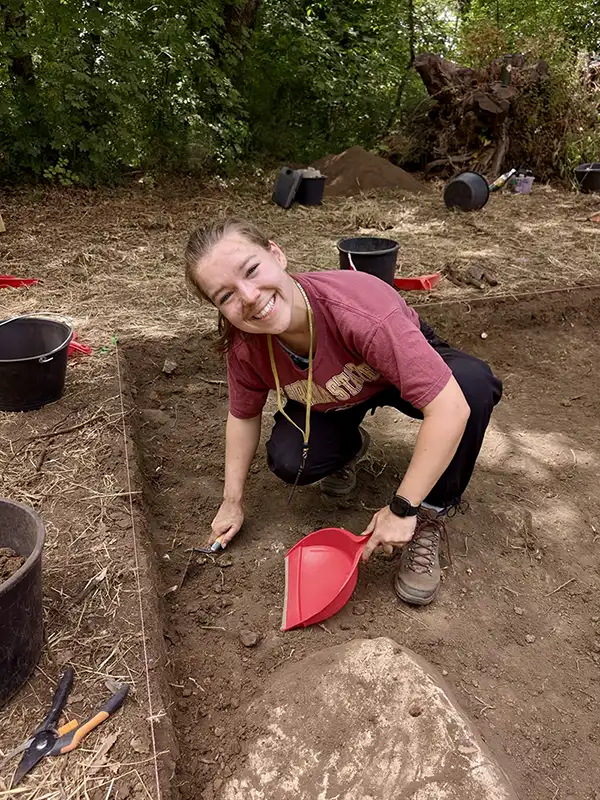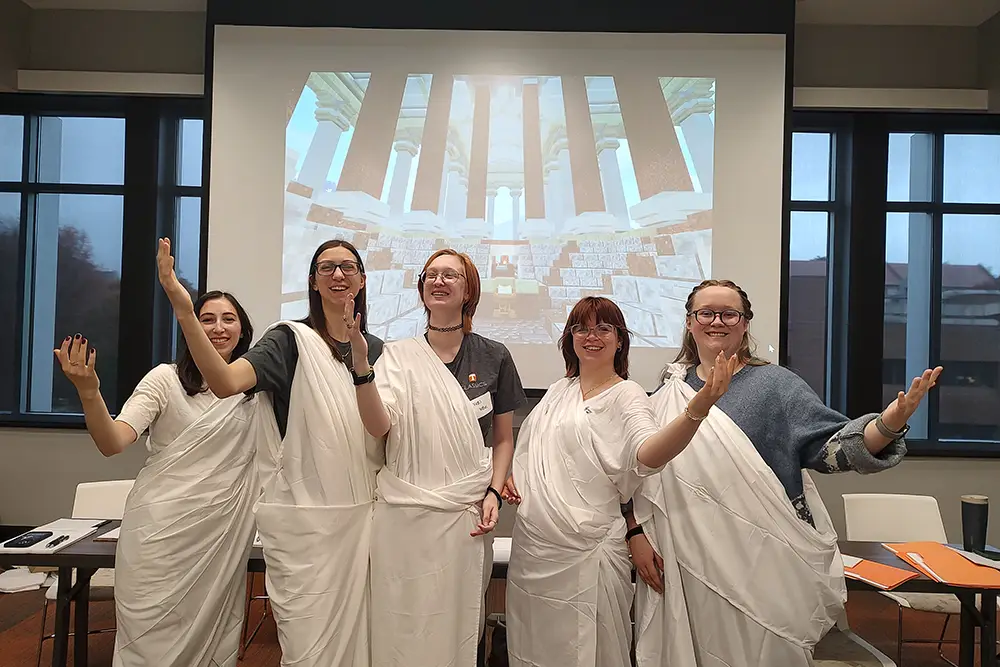

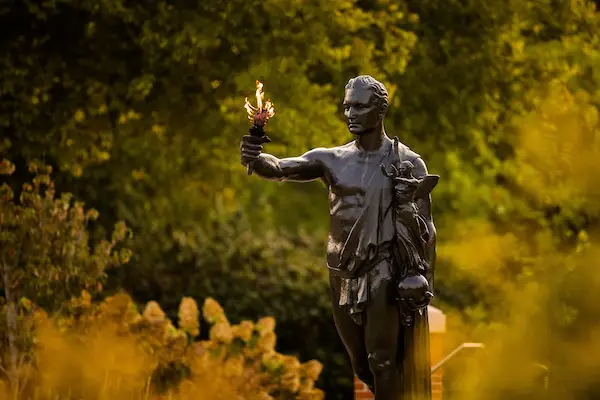
UT Classics Faculty in the Classroom and Beyond

As educators and scholars, members of the Department of Classics share their expertise and advance the field.
Justin Arft continues work on his book about the ancient Greek hero and Homer’s special oral poetic language. He presented work on ancient grammarians at the Classical Association of the Middle West and South (CAMWS) meeting. His chapter on Odyssey 7 is forthcoming in The Oxford Critical Guide to Homer’s Odyssey. Arft also is becoming co-editor of the journal Oral Tradition.
Tristan Barnes was promoted to teaching associate professor, after receiving the College of Arts and Sciences’ Lecturer Excellence in Teaching Award this past spring. He created two new courses. In Ancient Astronomy, students used UT’s planetarium and recreated ancient attempts to measure Earth’s circumference. In Greek and Roman Warfare, students used the departmental collection of high-quality armor replicas donated by Lynn Rogers of Elizabethton, Tennessee. Through experimental archaeology they tested the armor, gaining insights into soldiers’ lives.
Salvador Bartera returned to the classroom after a year of research leave at UT’s Denbo Center, where he worked on his book project, Stefonio’s Flavia Tragoedia. He attended the annual Tennessee World Language Teaching Association (TWLTA) meeting, then a conference on Tacitus in Lisbon, for which he published a report. He spent December at the American Academy in Rome, consulting manuscripts at Gregorian University. This summer he gave papers at conferences in Paris and St. Andrews, Scotland. He published an article on Scipione Ammirato and co-edited The Oxford Critical Guide to Tacitus.
Sam Blankenship presented research on Achaemenid Persian influences on Ezra-Nehemiah and on the Alexander historians at four conferences this past year in the US and Italy. She is incorporating these materials into her book project, thanks to a year’s research leave enabled by a Denbo Center fellowship. She will be reading Ezra-Nehemiah and Esther in the original Hebrew, which she has started learning. She taught Hellenistic history and Lucian’s True History.
Dylan Bloy continues to teach classes in Latin and both Greek and Roman archaeology. He presented on the final excavations of the Roman villa of Vacone, Italy, at the Archaeological Institute of America Annual Meeting; on Republican pavements at the Italian Association for the Study and Conservation of Mosaic conference; and on decorative marble at the international conference of the Association for the Study of Marble and Other Stones in Antiquity. The team is planning an excavation of the previously unexplored Roman Villa di Grottaglie in Fara Sabina, Italy, with a full field season next summer.
Stephen Collins-Elliott created two new packages for the open-source statistical program R last year: lakhesis, which gives archaeologists a visual, interactive interface with which to put archaeological contexts in chronological order through seriation, and eratosthenes, which provides a comprehensive framework for dating all archaeological events probabilistically. He gave an invited paper at German Archaeological Institute workshop in Madrid and a paper at the 52nd Annual Computer Applications in Archaeology Conference in Athens. This semester he is teaching History of the Roman Republic.
Chris Craig, professor emeritus, was inducted into the TWLTA Hall of Fame last fall. Incoming TWLTA President Abigail Braddock Simone (’02), his former student, presided.
Lorenzo Del Monte is now a teaching assistant professor. He continues research on the ancient Greek economy and has a new Greek history class being offered in the spring. Del Monte is continuing to expand his class about the Roman government and its influence on the US Constitution.
Professor Emerita Geraldine Gesell celebrated birthday LXXXXIII (or XCIII) in Greece and continues working on her volume of the Kavousi publication series.
Nikola Golubović is teaching new courses, such as Ancient Greek. He published an article in Classical Philology and has more articles and a book preface forthcoming. He also will be organizing a conference panel for the 2027 annual meeting of the Society for Classical Studies.
Reema Habib continues research in the field of ancient magic. She gave a talk on material approaches to herms at the 20th annual symposium of UT’s Marco Institute for Medieval and Renaissance Studies. Habib also is working on a new course with Tristan Barnes on pseudoarchaeological hoaxes, which will debut in the 2026 winter mini-term. She continues to serve on the Faculty Senate and is a Volunteer Experience Faculty Fellow this year, promoting student well-being.
Charles Kuper published his first book, The Menologion of Basil II with Harvard University Press. Now he is co-editing a volume titled Visual and Verbal Expressions in the Menologion of Basil II. He also has been invited to present this work at the University of Thessaloniki, Dumbarton Oaks in Washington, DC, and the International Congress on Medieval Studies at Kalamazoo, Michigan. He is teaching Latin paleography this fall, and loves working with our enthusiastic students.
Research Professor Merle Langdon continues work on the publication of sixth century BCE rock-cut shepherds’ inscriptions and drawings that he discovered in the area of Athens.
Susan Martin, provost and professor emerita, continues to serve on the department’s advisory board.
Professor Emeritus Robert Sklenář gave the keynote lecture of the XII Jornadas de Estudios Clásicos y Medievales at the Universidad Nacional de La Plata, Argentina, on October 1.
Aleydis Van de Moortel taught Ancient and Medieval Seafaring last spring and this fall is offering Ancient Technology. She directed a summer drone photography survey at Mitrou that led to the discovery of new burial mounds. She published an article downdating the adoption of the sail in the Bronze Age Aegean, and another one estimating labor costs of the Mycenaean drainage of the Copaic basin, arguing how the project enabled the king to consolidate power. She gave papers at two overseas conferences, including one on a jug from Mitrou depicting Sea People ships.
Jessica Westerhold served as faculty coordinator for the Undergraduate Classics Conference. In addition to teaching Latin elegy and ancient drama, she presented her research on happiness in Latin elegy at the Society for Classical Studies and CAMWS. In June, she was a discussant at the International Ovidian Society conference in Pisa, Italy.
Our current and former faculty members love to catch up with former students and hear about their current adventures and plans. Don’t hesitate to reach out!
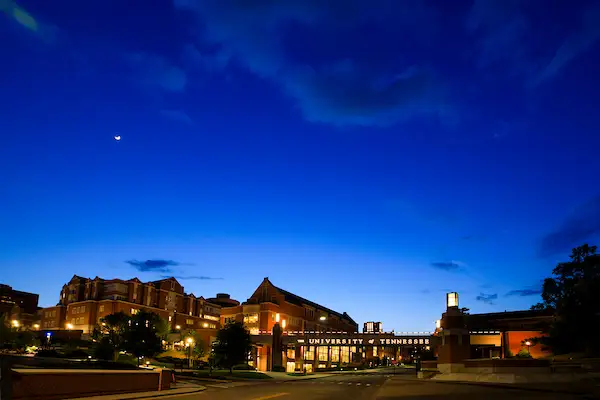
UT Classics Alumni Advancing in Careers

In Tennessee high schools, universities, and beyond, classics graduates are leading in education, research, and advocacy.
We are thrilled that Abigail Braddock Simone (’02) of Germantown High School is serving as president of the Tennessee World Language Teaching Association this year. We are lucky to have a teacher of her administrative savvy, powerful communications skills, and absolute commitment to our common cause in this leadership role.
Magister Sandy Hughes (’05) has a passion for emphasizing Greek as well as Roman culture in his Bearden High School classroom. He was accepted into the highly selective American School of Classical Studies Summer Seminar, “People and Places of Ancient Philosophy,” and he received the school’s Katherine Keene Scholarship to boot. Warmest congratulations, Harenose!
Jeremiah King (’01) went back to school for an MS in data science, while tutoring Latin to home-schooling students.
Award-winning Latin teacher Magistra Susan Neas Hankins (’86) has earned her wooden sword after 37 years at Greeneville High School (GHS). She has been a model teacher and citizen. We are delighted that Magistra Adelle Rosendale (’24) will follow in her footsteps at GHS.
Stephanie McCarter (’00), professor of classical literature at the University of the South in Sewanee, Tennessee, has received a Guggenheim Fellowship as well as a Loeb Classical Library Foundation Fellowship from Harvard University. She is on leave in Australia, working on a new translation of Ovid’s Art of Love, Cures for Love, and On Women’s Cosmetics. We can’t wait to see her next masterpiece!
Magistra Meera Patel (’18) earned an MS in data science with a specialization in artificial intelligence. She has created a mental health app for youth in Puerto Rico and now is working in the Hawai’i Department of Health, gathering and analyzing data on children’s health. She credits our department with providing her with a holistic education that is serving her well.
Ethan Peebles (’25) has been accepted into the MA program in early Christian studies at the University of Notre Dame, with full funding.
Magistra Kate Seat (’09) taught Latin five years in Kennesaw, Georgia, and is beginning her ninth year at the Collegiate School of Memphis. The school’s Latin program is thriving, with more than 90 students in a high school of about 200 students. Sixty percent of the seniors who started in the Latin program in 2022 have continued all the way to Latin IV, for which students can earn dual enrollment credit through the University of Memphis. Highlights from last year include 72% of students scoring at or above the national average on the National Latin Exam.
Magistra Mary Walter (’22, ’24) is starting her second year teaching Latin at Pigeon Forge High School, where the students are particularly interested in finding derivatives of words. She reports, “Kids are more interested in the culture than I thought they would be, and some of their questions are really interesting once you cut through to the real question (Did Caesar like soccer —> was Caesar a fan of sports/what sports did they have in Ancient Rome).” Obviously, you are a natural at this, Mary!
Classics Awards Ceremony Honors Students
Outstanding undergraduates and graduate students received scholarships and other recognition.
On May 1, 2025, our community of classicists gathered on the 12th floor of McClung Tower to celebrate the many achievements of our majors, minors, graduate students, and other affiliates, in the company of family and friends.
In addition to 11 graduating classics minors, we acknowledged 11 graduating majors: Isaac Buck, Desirae Cordell, Hunter DeBlackmere, Michael McCann, Lillian Hammer, Ethan Peebles, Makenzie Pentz, Evan Shannon, Dorothea Stansell, Elena Valerio, and Isabella Vozza.
The following students won year-long academic scholarships in classics:
- Landon Bryan (Arthur H. Moser Memorial Scholarship)
- Harley Diamond (Albert Rapp Memorial Scholarship)
- Drew Piper (McDow Scholarship)
- Alexander Wyrick (Chris and Ann Craig Scholarship)
- Reese Reiley (Haines-Morris Award)
Dorothea Stansell won the Senior Latin Prize, Makenzie Pentz received the Senior Greek Prize, and Evan Shannon received the Dedication and Service Prize.
Travel scholarships were awarded to Harley Diamond (Susan D. Martin Excellence Scholarship and Athena Scholarship); and Gabby Puckett, Anna Gibbs, Justin Langlois, and Andrew Montgomery (Haines-Morris Scholarships). Harley Diamond also received a Poikilia micro-grant.
At the college level, we acknowledged our Outstanding Graduates in each concentration: Ethan Peebles (Greek), Hunter DeBlackmere (Latin), Dorothea Stansell (Classical Civilization), and Lillian Hammer (Classical Archaeology).
The following majors were recognized as Volunteers of Distinction: Henry Greene, Ethan Peebles, and Evan Shannon. Alexander Wyrick received the Classical Association of the Middle West and South (CAMWS) Award for Outstanding Accomplishment in Classical Studies. We celebrated high scorers on the CAMWS Latin and Greek exams as well.
To cap off the ceremony, we heard part of Pindar’s first Olympian Ode, slightly adapted for the occasion to honor the UT Department of Classics.
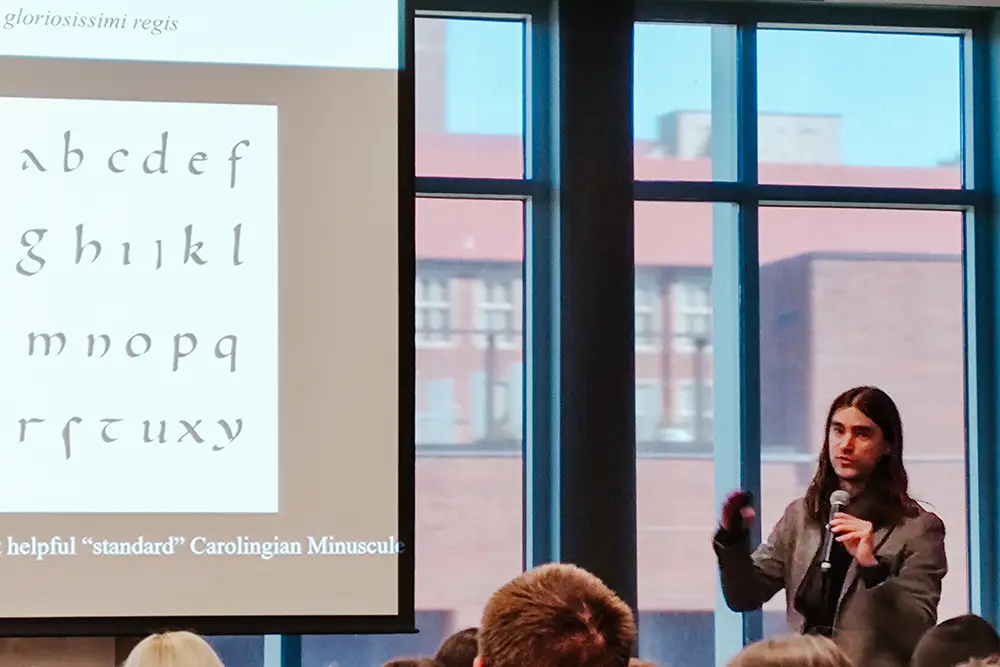
Latin Day XLII Brings High School Students to Campus

The 13th Annual Tennessee Undergraduate Classics Research Conference brought students from more than a dozen colleges and universities to the Knoxville campus.
The 42nd Annual Latin Day took place on October 17, 2024, in the UT Student Union. More than 300 young scholars, their teachers, and chaperones brought their love of the ancient Mediterranean to campus for a day of educational and entertaining lectures and workshops by classics and history faculty on topics such as the date of Vesuvius’ eruption, Roman races, and medieval manuscripts.
For the second year, UT’s Classics Club designed and moderated a much-appreciated myth-themed trivia game during the lunch period.
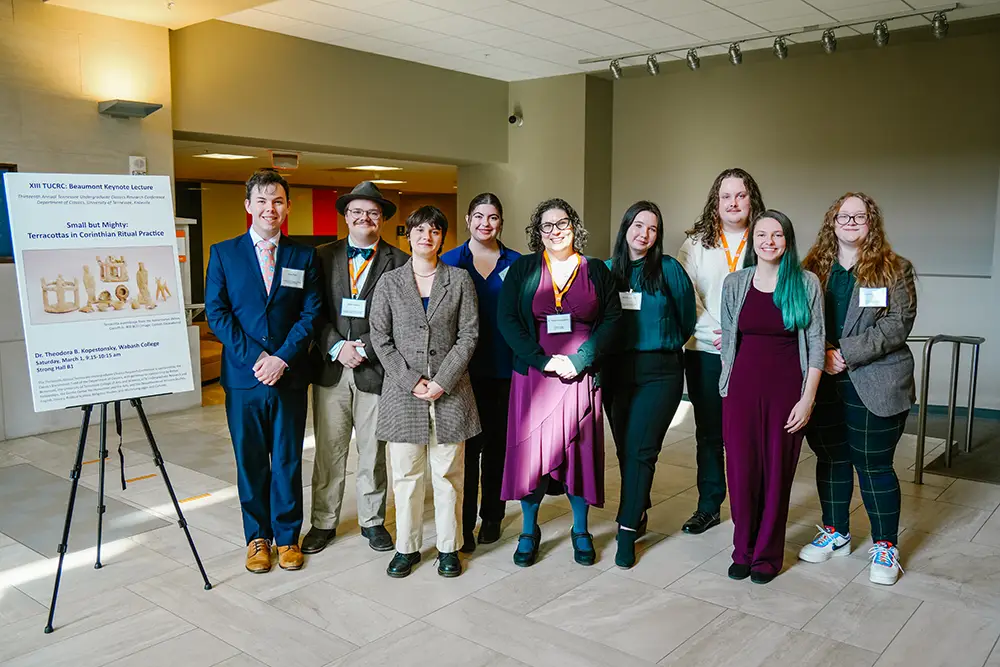
UT Classics Hosts Undergraduate Research Conference

The 13th Annual Tennessee Undergraduate Classics Research Conference brought students from more than a dozen colleges and universities to the Knoxville campus.
On March 1, 27 students from 14 US colleges and universities, including seven from UT, presented their research at the 13th Annual Tennessee Undergraduate Classics Research Conference.
Research topics ranged from Mycenaean feasts to Roman medicine, and UT classics faculty moderated the panels. A committee of UT undergraduates organized the event, assisted by humanities staff and Assistant Professor Jessica Westerhold as faculty advisor.
The day began with thought-provoking talks by Beauvais Lyons, Divisional Dean for Arts and Humanities, and our former colleague Theodora B. Kopestonsky, now at Wabash College, who delivered the Beaumont keynote lecture.
The event was sponsored by Bettye Beaumont, the Classics Enrichment Fund, the College of Arts and Sciences, UT’s Undergraduate Research and Fellowships, the Denbo Center for Humanities and the Arts, and the departments of Africana studies, English, history, political science, religious studies, and world languages and cultures. Read about the event in the College of Art’s and Sciences “Poetry, Plague, and More” article. Our 14th conference will be February 21, 2026.
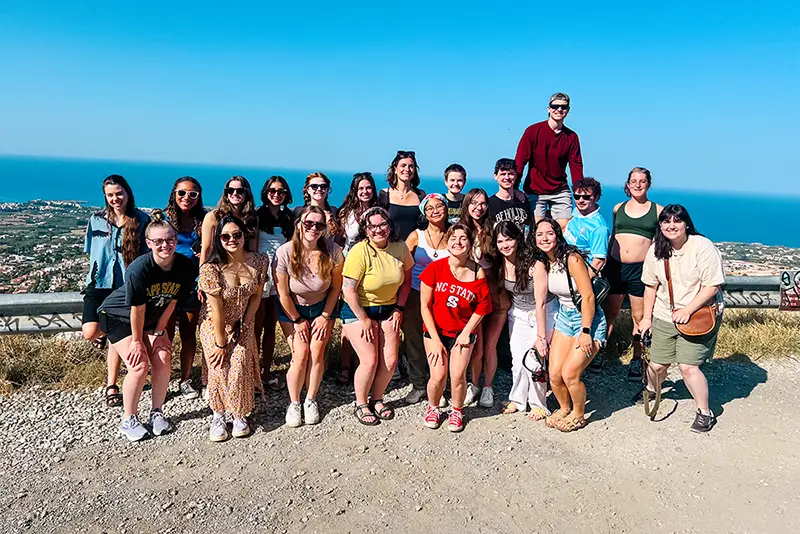
Unforgettable Classics Fieldwork and Study Abroad

UT students conducted research and explored ancient history in Greece, Cyprus, and Italy during summer 2025.
Scholarships and grants provided through the Department of Classics support undergraduate and graduate students’ research and bring learning to life. Following are examples from the summer of 2025.
Justin Langlois
Graduate student in Mediterranean archaeology
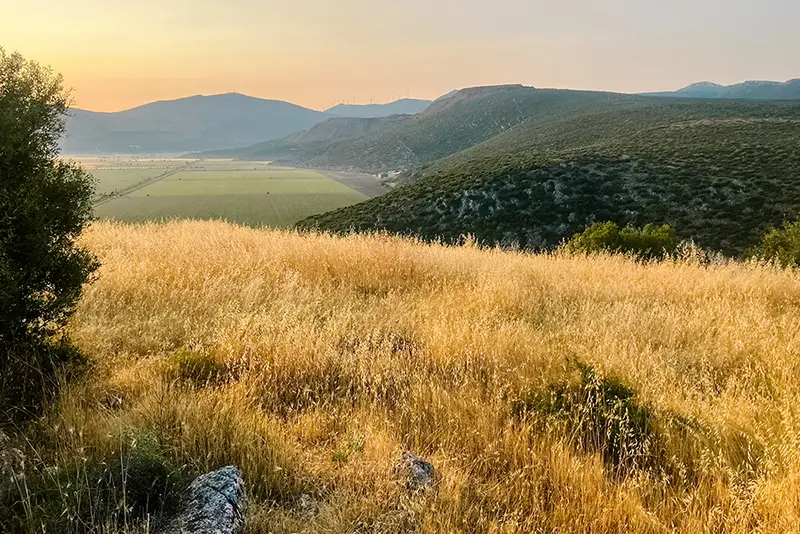
This summer I was fortunate to receive the Haines-Morris Travel Scholarship to travel to Greece and participate in the Agia Marina Pyrgos Excavations, led by Dr. Michael Lane of the University of Maryland-Baltimore County, while also visiting a range of Bronze Age and classical sites.
The highlight for me was the chance to visit Mitrou, the focus of my thesis project, which is a virtual reality reconstruction of the Middle and Late Bronze Age settlements at the site. My travels this summer helped me to visualize Mitrou’s place within the broader Bronze Age Greek landscape.
Although I have been working as an archaeologist in the American Southwest for years, this scholarship gave me valuable insights into fieldwork practices in Greece, which will directly shape the way I view the materials used to produce my thesis. Having seen the sites with my own eyes, I can now render a more vivid and accurate reconstruction of the ancient environment.
The human connections I made were just as memorable. Living in a small village, I was welcomed into a warm and close-knit community. The friendships I made and the generosity of the people left a lasting impression on me, deepening both my appreciation of Greece and my excitement for the path ahead.
Andrew Montgomery
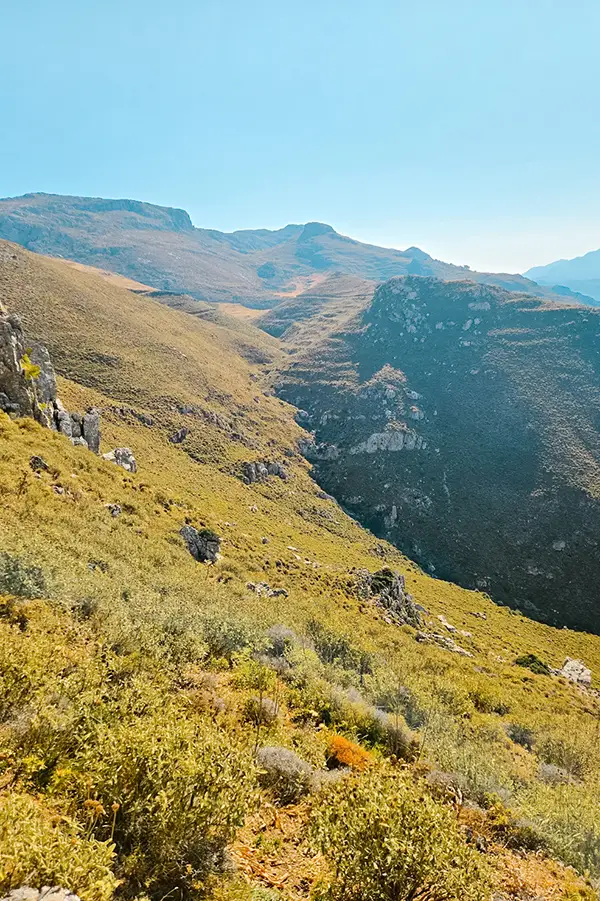
Graduate student in Mediterranean archaeology
Thanks to the generosity of a Haines-Morris Travel Scholarship, I spent two and a half weeks on the island of Crete in southern Greece.
My master’s thesis research focuses on Minoan peak sanctuaries and their viability as astronomical observation sites. In all, I was able to visit 12 of these mountain sanctuaries.
By using a sighting compass with a clinometer, I gathered a plethora of data on the orientation of sanctuary structures, which could not be measured accurately with satellite imagery. I will use the data to determine possible astronomical alignments.
While these peak sanctuaries are largely on public land, some of the sites were more difficult to access than others. However, the views were breathtaking. Crete is a mountainous island, and many of the sites were at elevations of over 1000 meters and required long hikes. I also dealt with many fences and some huge shepherds’ dogs who did not like to let me pass!
My trip was a fantastic research experience that would not have been possible without the support of the sponsors and this department.
Harley Diamond
Undergraduate student
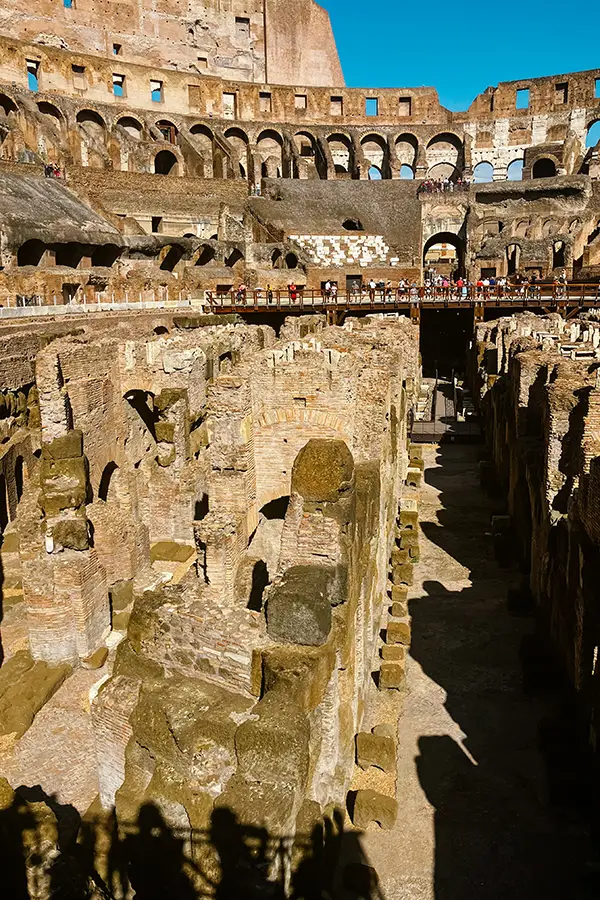
During my summer abroad, I took Classical Mythology at the Lorenzo de Medici Institute in Florence, Italy. This course was taught by an archaeologist based in Florence who has worked with the National Archaeological Museum in Florence. The highlight of the course for me was the professor’s guided tour of the museum.
I am grateful for all the amazing museums that I was able to visit while in Italy. I loved being able to visit somewhere that shares my values of preserving cultural heritage and making it accessible for people from around the world.
I also took short trips to Assisi, Siena, and Rome. In Assisi, I saw the Basilica of Saint Francis and the ruins of the temple to Minerva located underneath the present-day Piazza. During my trip to Siena, I saw the beautiful Siena Cathedral and the medieval town of San Gimignano.
I also had an incredible time in Rome! I was able to see the Colosseum, the Forum, Palatine Hill, and the Capitoline Museum. I am hopeful that I will be able to return to Rome in the future and explore all the other amazing sites there.
I am grateful for the Athena Travel Grant and the Susan D. Martin Scholarship that made this trip possible. My summer experiences have inspired me for my future career in collections management.
Gabby Puckett
Undergraduate student
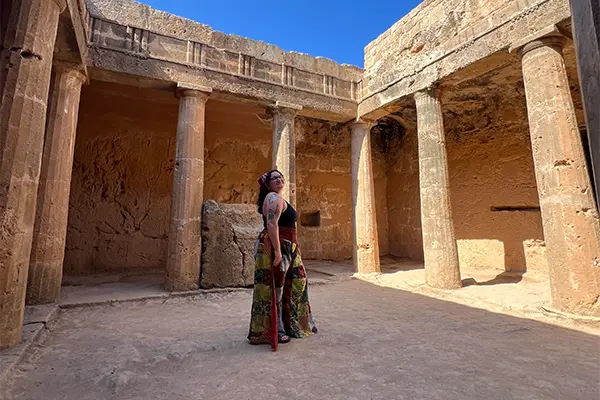
Thanks to a Haines-Morris Travel Scholarship from the Department of Classics, I had the opportunity to spend my summer excavating at Makounta-Voules in Polis Chrysochous, Cyprus.
Each day began before sunrise. We pulled our water bottles from the freezer, and by 5 a.m. we were on the bus. I never missed the chance to watch the sun rise over the mountains while the moon disappeared.
Each morning we excavated the site, and in the afternoons we conducted lab work. My personal project was to work on cleaning faunal remains from past seasons, removing calcium deposits so they could be studied more effectively. This hands-on lab work reinforced my passion for zooarchaeology and gave me skills that will be invaluable in my future career.
Of course, it was not all work. Afternoons often ended with swims in the Mediterranean, where we shared laughs and stories after long hours in the trenches. Some fond memories are from these moments with new friends, watching the sun sink into the sea.
This experience confirmed for me that archaeology is not just something I want to study, it is something I want to do for the rest of my life. I am deeply grateful for the support and encouragement that made this unforgettable opportunity possible.
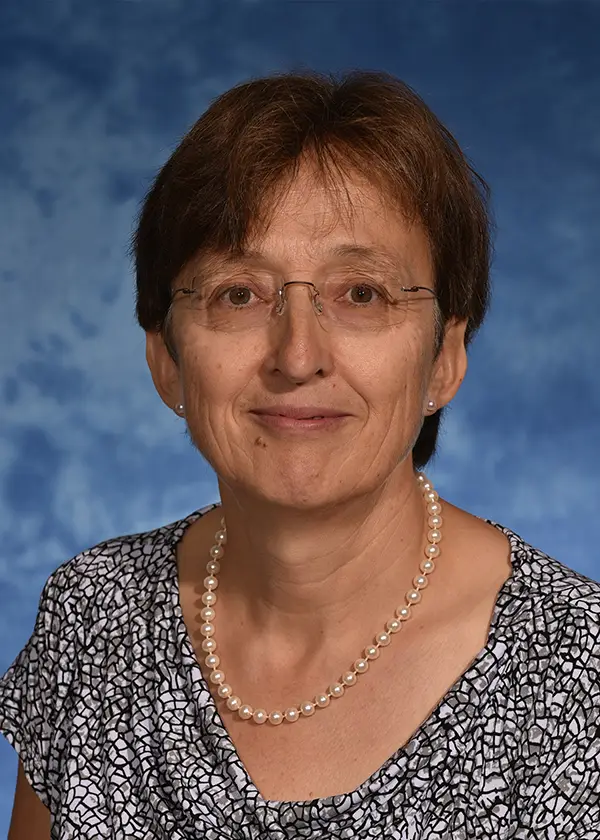
Greetings from Knoxville!

Message from Department of Classics Head Aleydis Van de Moortel
We have had another banner year in our department. As reflected in this issue of the newsletter, our faculty continue to pursue amazing projects, and we keep attracting great students to our undergraduate programs and the graduate program in Mediterranean archaeology. l still enjoy heading our dynamic and collegial department and teaching our enthusiastic students.
Given page constraints in the print edition of our newsletter, I will not provide my usual overview but let our activities speak for themselves.
Thank you all for your support, and please stay in touch!
